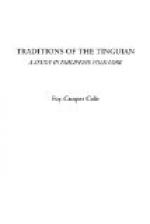In the first tale Aponitolau himself appears as “the sun,” “the man who makes the sun,” as “a round stone which rolls,” but when it is established that he is the son of a couple in Kadalayapan he apparently relinquishes his duties in the sky and goes to live in the village of his people. With him goes his wife Aponibolinayen, who had been carried above by a vine. While at his post in the heavens, Aponitolau is closely associated with the big star, whose duty it is to follow him in the sky. Again we are told that Aponitolau is taken up by the spirit Kabkabaga-an, whom he marries and by whom he has a son (p. 114). In some instances this hero and his son Kanag converse with thunder and lightning, which appear at times not unlike human beings (p. 100); but in the eighth relation the two kinds of lightning are pictured as dogs who guard the town of Dona.
These people enjoy unusual relations with inanimate things, and we find them conversing with spears and with jars. [29] In one case the latter appear to be pastured like animals, and surround Aponitolau when he goes to feed them with lawed [30] leaves and salt (p. 51). Weapons weep blood and oil when taken down for the purpose of injuring certain persons (p. 43). A nose flute, when played by a youth, tells him of his mother’s plight (p. 152), while a bamboo Jew’s harp summons the brothers of its owner (p. 162). Animals and birds are frequently in communication with them: The hawk flies away and spreads the news of the fight at Adasin [31] (p. 90); at the bidding of Dalonagan a spider spins a web about the town (p. 124); and Aponitolau is enabled to fulfill the labors assigned him by the ten-headed giant only through the aid of spiders, ants, and flies (p. 101). [32] During certain dances the water from the river flows over the town and fish come up and bite the feet of the dancers (p. 59). Crocodiles are left to guard the sister of Aponibalagen, and when they fail to explain their negligence they are whipped and sent away by their master (p. 87). A great bird is pleased with Aponitolau and carries him away [33] to its home, where it forces him to marry a woman it had previously captured (p. 92). In one instance an animal gives birth to a human child; a frog laps up the spittle of Aponitolau, and as a result becomes pregnant [34] and gives birth to a maiden who is taken away by the spirits (p. 105). Another account states that the three sons of Aponitolau and Aponibolinayen are born as pigs, but later assume human form (p. 116). Kanag becomes a snake when he tries to secure the perfume of Baliwan, but is restored to human form when he bathes in a magic well (p. 137). These and other mysterious happenings, many of which are not explained as being due to their own volition, befall them; thus Ingiwan, while walking, is confronted by an impassable hill and is compelled to cross the ocean, where he finds his future wife, but upon his return the hill has vanished (p. 86). In other instances the finger




